小学一般现在时讲解及练习题
完整版)小学一般现在时讲解及练习题
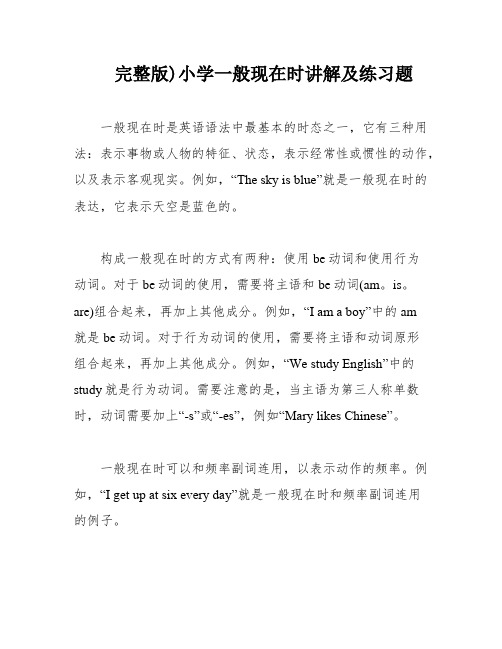
完整版)小学一般现在时讲解及练习题一般现在时是英语语法中最基本的时态之一,它有三种用法:表示事物或人物的特征、状态,表示经常性或惯性的动作,以及表示客观现实。
例如,“The sky is blue”就是一般现在时的表达,它表示天空是蓝色的。
构成一般现在时的方式有两种:使用be动词和使用行为动词。
对于be动词的使用,需要将主语和be动词(am。
is。
are)组合起来,再加上其他成分。
例如,“I am a boy”中的am就是be动词。
对于行为动词的使用,需要将主语和动词原形组合起来,再加上其他成分。
例如,“We study English”中的study就是行为动词。
需要注意的是,当主语为第三人称单数时,动词需要加上“-s”或“-es”,例如“Mary likes Chinese”。
一般现在时可以和频率副词连用,以表示动作的频率。
例如,“I get up at six every day”就是一般现在时和频率副词连用的例子。
一般现在时还可以用于构成否定句、一般疑问句和特殊疑问句。
对于be动词的否定句,需要在be动词后面加上not。
例如,“He is not a worker”就是be动词的否定句。
对于行为动词的否定句,需要在主语和动词原形之间加上don't或doesn't。
例如,“I don't like bread”和“He doesn't often play”就是行为动词的否定句。
对于一般疑问句,需要将be动词或do/does放在主语前面。
例如,“Are you a student?”就是一般疑问句。
对于特殊疑问句,需要在疑问词后面加上一般疑问句。
例如,“Where is my bike?”就是特殊疑问句。
需要注意的是,当主语为第三人称单数时,否定句和一般疑问句需要用doesn't,而不是don't或do。
例如,“He doesn't often play”和“Does she go to work by bike?”就是主语为第三人称单数时的否定句和一般疑问句。
小学英语五年级一般现在时态总结及练习

一般现在时(1)一般现在时中的be动词:一般用原形:am is aream用于第一人称单数(I);is用于第三人称单数(he she it和其他人名或称谓,如:Ben his sister 等);are用于第二人称单数(you)和所有复数(包括第一人称复数we、第二人称复数you;第三人称复数they和其他复数,如the children 、his parents等)。
(2)一般现在时中的动词:第一种情况:主语是第三人称单数(he she it 和其他,如Helen 、her cousin 等),动词后一般加s或es。
第二种情况:主语不是第三人称单数,动词都用原形。
(4)一般现在时判断依据(如何判断一个句子是一般现在时):△be动词是am、is、are △动词用原形或加s、es△没有时间状语或有usually、often、everyday、sometimes等不是具体的时间一般现在时态练习题一一、写出下列单词的第三人称单数形式。
ask---- meet---- teach---- sit----kick---- look---- listen---- eat----put---- knock---- open---- give----see---- pull---- show---- wash----try---- take---- wake---- shut----count---- share---- post---- play----hide---- seek---- hold---- stand----do---- jump---- stop---- touch----二、写出下列动词的原形。
ends---- rains---- shines---- rises----sets---- sleeps---- gets---- goes----stays---- arrives---- walks---- drives----spends---- forecasts---- fixes---- works----travels---- cleans----三、用所给动词的一般现在时填空。
(完整版)小学英语一般现在时习题集(200题)
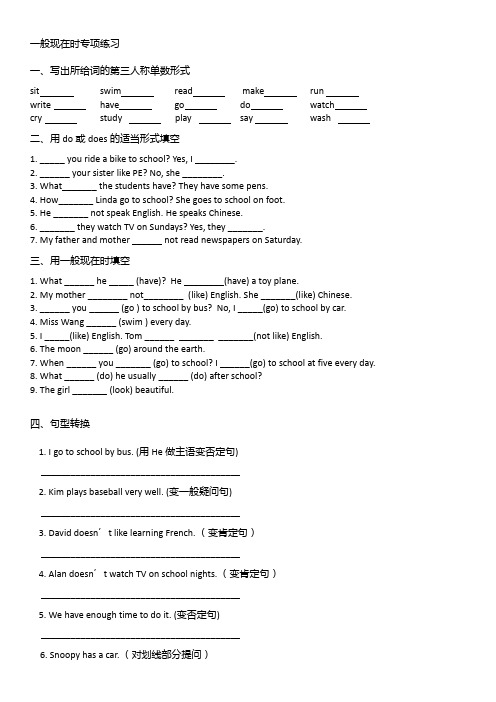
一般现在时专项练习一、写出所给词的第三人称单数形式sit swim read make runwrite have go do watchcry study play say wash二、用do或does的适当形式填空1._____you ride a bike to school?Yes,I________.2.______your sister like PE?No,she________.3.What_______the students have?They have some pens.4.How_______Linda go to school?She goes to school on foot.5.He_______not speak English.He speaks Chinese.6._______they watch TV on Sundays?Yes,they_______.7.My father and mother______not read newspapers on Saturday.三、用一般现在时填空1.What______he_____(have)?He________(have)a toy plane.2.My mother________not________(like)English.She_______(like)Chinese.3.______you______(go)to school by bus?No,I_____(go)to school by car.4.Miss Wang______(swim)every day.5.I_____(like)English.Tom____________________(not like)English.6.The moon______(go)around the earth.7.When______you_______(go)to school?I______(go)to school at five every day.8.What______(do)he usually______(do)after school?9.The girl_______(look)beautiful.四、句型转换1.I go to school by bus.(用He做主语变否定句)________________________________________2.Kim plays baseball very well.(变一般疑问句)________________________________________3.David doesn’t like learning French.(变肯定句)________________________________________4.Alan doesn’t watch TV on school nights.(变肯定句)________________________________________5.We have enough time to do it.(变否定句)________________________________________6.Snoopy has a car.(对划线部分提问)______________________________________7.Do you have a pencil?(把主语改成she)_____________________________________________8.They play basketball in the park on Sunday morning.(对划线提问)○1○2○3_________________________________________________________________________________________________________________________________________________________________________________________________________I、用括号中所给词的适当形式填空:1. The buses______(use)a lot of oil.2. Each of us______(have)strong points and weak points.3. My daughter_________(watch)TV every day.Sometimes she_______(see)a film on Sunday.4. Li Wei________(have)a daughter.She stays_______in a nursery.5. Our family_________(be)a happy one.6. Her mother___________(teach)English at a middle school.7. Jack often___________(listen)to the radio.8. He________(say)that Prof.Li is_____tired.改句子1. This is my pencil.(变一般疑问句)____ _______________ your pencil ?2.Thes.re.sock.ar.Kate’..(变一般疑问句).___________________.sock.Kate’...3..wan.t.bu..bi.gree.ba..(变特殊疑问句._________________.yo.wan.t.bu..4.Mar.doe.no.hav.an.book..(变肯定句)Mar.___________________book...5.Th.clothin.sho.i.o.sal..(变为否定)________________________________.6.Sh.like.th.blac.ba.ver.muc..(变为否定句.______________________________.7..bu.th.pant.fo.onl.5.Yuan.(用she改写句子)__.________________.th.pant.fo.onl.5.Yuan.8.It’.a.Englis.dictionar..(对画线部分提问.____________________________.9.Lil.an.Luc.ar.fiftee.year.ol.no..(对画线部分提问)____._______________Lil.an.Luc..10.He.do.i..year.an..month.ol..(变为否定句. He.do.___.____..year.an..month.ol...11.W.liv.i.Nanchang.(改为否定句.W.___.___.___.i.Nanchan..12.It’.lunc.time.(改为同义句.It’._____._____._____.......13.M.sweate.i.blac.an.white.(对划线部分提问._____._____.i._____.sweater.14.Sh.ha.long.blac.hair.(改为同义句.___.hai.___.lon.an.black.15..The.ar.thre.blu.desks.(对划线部分提问.___.___.they?用所给动词的适当形式填空。
(完整版)小学英语四种时态练习题丁晓彤
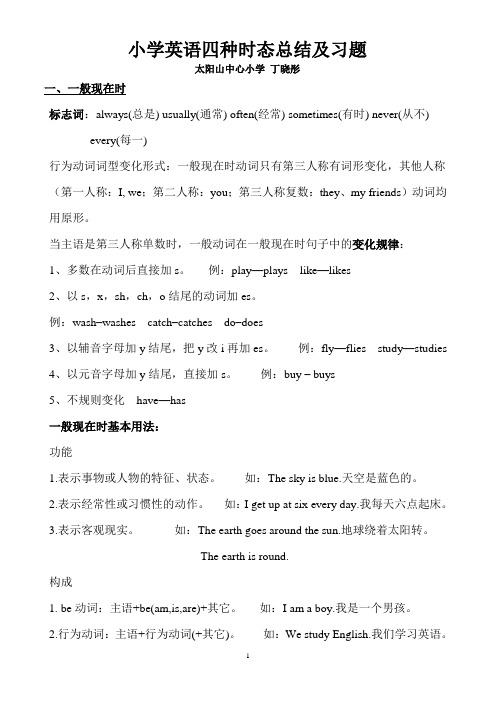
小学英语四种时态总结及习题太阳山中心小学丁晓彤一、一般现在时标志词:always(总是) usually(通常) often(经常) sometimes(有时) never(从不) every(每一)行为动词词型变化形式:一般现在时动词只有第三人称有词形变化,其他人称(第一人称:I, we;第二人称:you;第三人称复数:they、my friends)动词均用原形。
当主语是第三人称单数时,一般动词在一般现在时句子中的变化规律:1、多数在动词后直接加s。
例:play—plays like—likes2、以s,x,sh,ch,o结尾的动词加es。
例:wash–washes catch–catches do–does3、以辅音字母加y结尾,把y改i再加es。
例:fly—flies study—studies4、以元音字母加y结尾,直接加s。
例:buy – buys5、不规则变化have—has一般现在时基本用法:功能1.表示事物或人物的特征、状态。
如:The sky is blue.天空是蓝色的。
2.表示经常性或习惯性的动作。
如:I get up at six every day.我每天六点起床。
3.表示客观现实。
如:The earth goes around the sun.地球绕着太阳转。
The earth is round.构成1. be动词:主语+be(am,is,are)+其它。
如:I am a boy.我是一个男孩。
2.行为动词:主语+行为动词(+其它)。
如:We study English.我们学习英语。
句型肯定句:A. be动词:主语+ be + 其它成分如:He is a worker.B.行为动词:主语+动词(注意人称变化) +其它成分如:We like the little cat.否定句:A. be动词:主语+ be + not +其它成分如:They are not students.B.行为动词:主语+助动词(do/does) + not +动词原形+其它成分如:We don’t like the little cat.一般疑问句:A. be动词:Am / Is /Are +主语+ 其它成分如:Are you a teacher? Yes, I am. / No, I am not.Are they students of your school?Yes they are / No they aren’t.B.行为动词:助动词(Do/Does)+主语+动词原形+ 其它成分如:Do you like it? Yes, I do. / No. I don’t .Does he(she) like it? Yes, he( she )does. / No, he ( s he )doesn’t.特殊疑问句:疑问词+ 一般疑问句A. be动词:How many students are there in your school?B.行为动词:What do you usually do on Sunday?一般现在时动词be和have的变化形式1.动词Be 用法:第一人称单数用am,第三人称单数用is,其它人称用are。
小学英语一般现在时三单动词的变化规则及练习题

在句子中,一般现在时三单动词的变化规则可以用来描述事实、表达观点 或传达信息。
通过使用一般现在时三单动词的变化规则,可以使句子更加简洁、明了, 易于理解。
在英语学习中,掌握一般现在时三单动词的变化规则在实际中的应用非常 重要,可以提高语言表达能力。
一般现在时三单 动词的变化练习
题
单选练习题
一般现在时态中,动词第三人称单数的变化规则是:A. 动词原形 B. 动词+s C. 动词+es D. 动词+ing
下列句子中,动词形式正确的是:A. He like playing basketball B. She goes to school at 7:00 every day C. They like to eat apples D. We don't like to play in the rain
在日常交流中的应用
描述日常行为和习惯
表达经常发生的动作或状态
描述事物的性质和特征
表达个人的喜好和意愿
在写作中的应用
描述日常行为和习惯
表达个人观点和喜好
描述事件和经历
编写故事和虚构情境
感谢您的观看
汇报人:XX
下列句子中,动词形式不正确的是:A. He plays basketball every day B. She eats an apple every morning C. They like eat apples D. We don't like to play in the rain
下列句子中,动词形式正确的是:A. He doesn't like to eat vegetables B. She doesn't like playing the piano C. They don't like to read books D. We don't like eating apples
小学六年级上册英语时态精讲练习
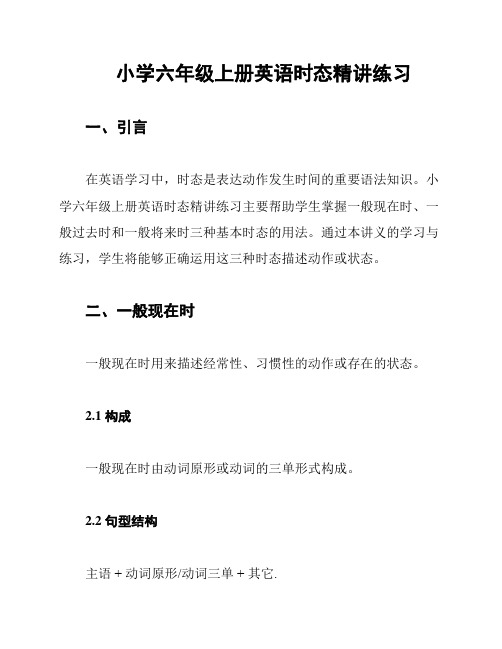
小学六年级上册英语时态精讲练习一、引言在英语学习中,时态是表达动作发生时间的重要语法知识。
小学六年级上册英语时态精讲练习主要帮助学生掌握一般现在时、一般过去时和一般将来时三种基本时态的用法。
通过本讲义的学习与练习,学生将能够正确运用这三种时态描述动作或状态。
二、一般现在时一般现在时用来描述经常性、习惯性的动作或存在的状态。
2.1 构成一般现在时由动词原形或动词的三单形式构成。
2.2 句型结构主语 + 动词原形/动词三单 + 其它.2.3 练习1. I (eat)_____ breakfast every morning.2. She (go)_____ to school by bus.3. The cat (sleep)_____ on the sofa.三、一般过去时一般过去时用来描述过去发生的动作或存在的状态。
3.1 构成一般过去时由动词的过去式构成。
3.2 句型结构主语 + 动词过去式 + 其它.3.3 练习1. I (watch)_____ a movie yesterday.2. She (visit)_____ her grandparents last week.3. They (play)_____ soccer in the park.四、一般将来时一般将来时用来描述将来要发生的动作或存在的状态。
4.1 构成一般将来时有两种构成方式:will + 动词原形和 be going to + 动词原形。
4.2 句型结构1. 主语 + will + 动词原形 + 其它.2. 主语 + be going to + 动词原形 + 其它.4.3 练习1. I (buy)_____ a new bike next month.2. She (travel)_____ to Japan with her family.3. They (move)_____ to a new house in two years.五、总结通过本讲义的学习与练习,学生应掌握一般现在时、一般过去时和一般将来时三种基本时态的构成、句型结构和用法。
小学语法专题:一般现在时全练全析

小学语法专题:一般现在时全练全解析1.One student ____singing.A.liking B.like C.likes全解析:C喜欢,动词单三形式,与主语匹配。
故选C。
2.— _____ it often cloudy in winter in Jianhu?—Yes.A.Does B.Was C.Is D.Did全解析:一般疑问句提前,首字母大写。
C选项正确。
助动词Does要和实义动词谓语搭配,这里没有。
淘汰。
故答案为:C。
3.I _______ go to Harbin. The snow is very beautiful in winter.A.wants to B.want to C.want全解析:want to do sth想要做某事,本句主语是第一人称,谓语动词用原形。
与选项B相匹配。
故选B.4.I like______ my mother.A.help B.to help C.helps全解析:固定搭配like to do sth. 的意思是“喜欢做某事”。
故答案为:B5.My grandmother always________ a pair of _______.A.wore; glass B.wears; glasses C.wear; glasses全解析:always常常一般用于一般现在时中,My grandmother是第三人称单数,后用动词单三式,故答案为B。
6.Mike often on Fridays.A.does homework B.do homework C.doing homework全解析:动词原形,选项C做作业,现在分词,可知选项A符合题意,故选A.7.— _______________ Oliver visit his grandparents every weekend?— Yes, he loves them very much.A.Do B.Does C.Is全解析:根据答语是肯定回答,问句是一般疑问句,every weekend每个周末,是一般现在时的时间状语,主语是第三人称单数,谓语动词visit是实意动词,助动词用does。
小学生一般现在时讲解及练习题
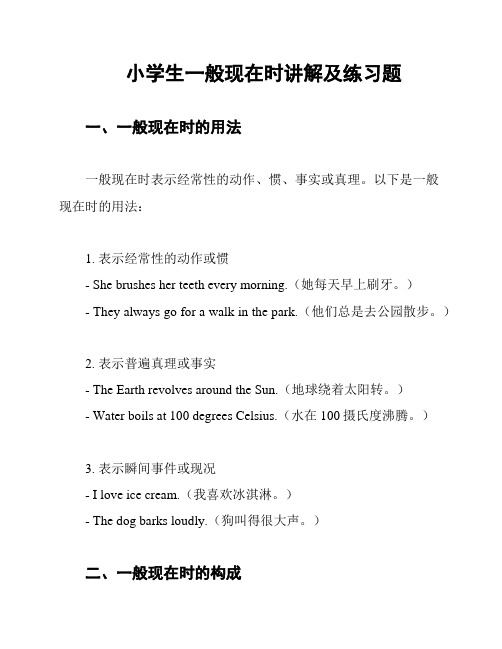
小学生一般现在时讲解及练习题一、一般现在时的用法一般现在时表示经常性的动作、惯、事实或真理。
以下是一般现在时的用法:1. 表示经常性的动作或惯- She brushes her teeth every morning.(她每天早上刷牙。
)- They always go for a walk in the park.(他们总是去公园散步。
)2. 表示普遍真理或事实- The Earth revolves around the Sun.(地球绕着太阳转。
)- Water boils at 100 degrees Celsius.(水在100摄氏度沸腾。
)3. 表示瞬间事件或现况- I love ice cream.(我喜欢冰淇淋。
)- The dog barks loudly.(狗叫得很大声。
)二、一般现在时的构成在一般现在时中,动词的变化相对简单。
1. 对于第三人称单数(He/She/It),动词要加-s或-es。
- He walks to school every day.(他每天走路去学校。
)- She eats an apple.(她吃一个苹果。
)- It runs fast.(它跑得很快。
)2. 对于其他人称(I/You/We/They),动词不变。
- I play soccer on weekends.(我周末踢足球。
)- You read books every night.(你每晚读书。
)- We go swimming in summer.(我们夏天去游泳。
)- They watch movies together.(他们一起看电影。
)三、练题请根据句意填入正确的动词形式。
1. My mother __________ (cook) dinner for us every evening.2. Tom and Lisa __________ (play) tennis on Saturdays.3. The sun __________ (rise) in the east.4. We __________ (study) English at school.5. Dogs __________ (bark) when they see strangers.1. cooks2. play3. rises4. study5. bark希望以上讲解和练习题对你有帮助!。
小学英语语法时态归纳及练习(含答案解析)

英语时态归纳一、一般现在时:标志词:often(经常) sometimes(有时) always(总是) usually(通常) never(从不) every(每一)行为动词词型变化形式:一般现在时动词只有第三人称有词形变化;其他人称(第一人称:I, we;第二人称:you;第三人称复数:they、my friends)动词均用原形。
当主语是第三人称单数时,一般动词在一般现在时句子中的变化规律:1、多数在动词后加s:play—plays like—likes ,2、以s,x,sh,ch,o结尾的动词加es wash–washes catch–catches do–does3、以辅音字母加y结尾,把y改i再加es fly—flies study—studies4、以元音字母加y结尾,直接加s buy – buys5、不规则变化have—has一般现在时基本用法功能1.表示事物或人物的特征、状态。
如:The sky is blue.天空是蓝色的。
2.表示经常性或习惯性的动作。
如:I get up at six every day.我每天六点起床。
3.表示客观现实。
如:The earth goes around the sun.地球绕着太阳转。
The earth is round.构成1. be动词:主语+be(am,is,are)+其它。
如:I am a boy.我是一个男孩。
2.行为动词:主语+行为动词(+其它)。
如:We study English.我们学习英语。
句型肯定句:A.be动词:主语+ be + 其它成分He is a worker.B.行为动词:主语+动词(注意人称变化) +其它成分We like the little cat.否定句:A.be动词:主语+ be + not+其它成分They are not students.B.行为动词:主语+助动词(do/does) + not+动词原形+其它成分We don’t like the little cat.一般疑问句:A.be动词:Am / Is /Are +主语+ 其它成分Are you a teacher? Yes, I am. / No, I am not.Are they students of your school. Yes, they are / No they aren’t.B.行为动词:助动词(Do/Does)+主语+动词原形+ 其它成分Do you like it? Yes, I do. / No. I don’t .Does he(she) like it? Yes, he( she )does. / No, he ( she )doesn’t.特殊疑问句:疑问词+ 一般疑问句A.be动词:How many students are there in your school?B.行为动词:What do you usually do on Sunday?一般现在时动词be和have的变化形式1.动词Be 叫连系动词, 用法:第一人称单数用am,第三人称单数用is,其它人称用are。
小学一般现在时练习题及答案解析
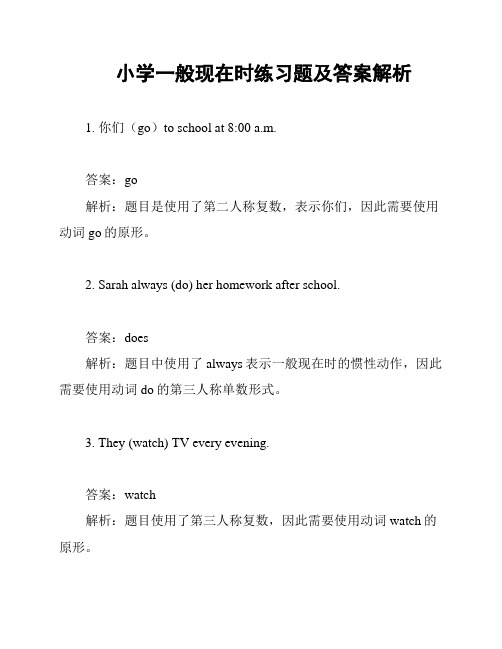
小学一般现在时练习题及答案解析1. 你们(go)to school at 8:00 a.m.答案:go解析:题目是使用了第二人称复数,表示你们,因此需要使用动词go的原形。
2. Sarah always (do) her homework after school.答案:does解析:题目中使用了always表示一般现在时的惯性动作,因此需要使用动词do的第三人称单数形式。
3. They (watch) TV every evening.答案:watch解析:题目使用了第三人称复数,因此需要使用动词watch的原形。
4. We (play) soccer on Saturdays.答案:play解析:题目使用了第一人称复数,因此需要使用动词play的原形。
5. My sister (study) Chinese at school.答案:studies解析:题目使用了第三人称单数,因此需要使用动词study的第三人称单数形式。
6. Tom and Jerry (like) to eat pizza.答案:like解析:题目使用了第三人称复数,因此需要使用动词like的原形。
7. I (watch) movies on weekends.答案:watch解析:题目使用了第一人称单数,因此需要使用动词watch的原形。
8. The birds (fly) in the sky.答案:fly解析:题目使用了第三人称复数,因此需要使用动词fly的原形。
9. He (play) basketball after school.答案:plays解析:题目使用了第三人称单数,因此需要使用动词play的第三人称单数形式。
10. We (get up) at 6:30 a.m. every day.答案:get up解析:题目使用了第一人称复数,因此需要使用动词get up的原形。
以上是小学一般现在时练习题及答案解析。
小学英语一般现在时专项练习
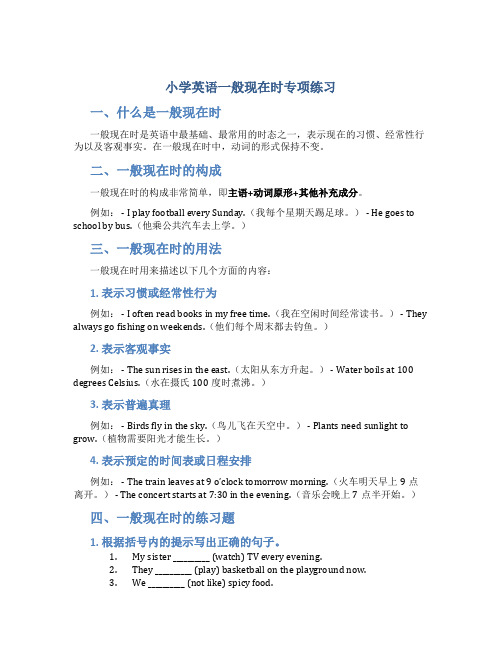
小学英语一般现在时专项练习一、什么是一般现在时一般现在时是英语中最基础、最常用的时态之一,表示现在的习惯、经常性行为以及客观事实。
在一般现在时中,动词的形式保持不变。
二、一般现在时的构成一般现在时的构成非常简单,即主语+动词原形+其他补充成分。
例如: - I play football every Sunday.(我每个星期天踢足球。
) - He goes to school by bus.(他乘公共汽车去上学。
)三、一般现在时的用法一般现在时用来描述以下几个方面的内容:1. 表示习惯或经常性行为例如: - I often read books in my free time.(我在空闲时间经常读书。
) - They always go fishing on weekends.(他们每个周末都去钓鱼。
)2. 表示客观事实例如: - The sun rises in the east.(太阳从东方升起。
) - Water boils at 100 degrees Celsius.(水在摄氏100度时煮沸。
)3. 表示普遍真理例如: - Birds fly in the sky.(鸟儿飞在天空中。
) - Plants need sunlight to grow.(植物需要阳光才能生长。
)4. 表示预定的时间表或日程安排例如: - The train leaves at 9 o’clock tomorrow morning.(火车明天早上9点离开。
) - The concert starts at 7:30 in the evening.(音乐会晚上7点半开始。
)四、一般现在时的练习题1. 根据括号内的提示写出正确的句子。
1.My sister __________ (watch) TV every evening.2.They __________ (play) basketball on the playground now.3.We __________ (not like) spicy food.4.The dog __________ (bark) loudly at strangers.5.She __________ (do) her homework after school every day. 2. 选择适当的词填空,完成下列句子。
小学英语语法一般现在时(包括练习)
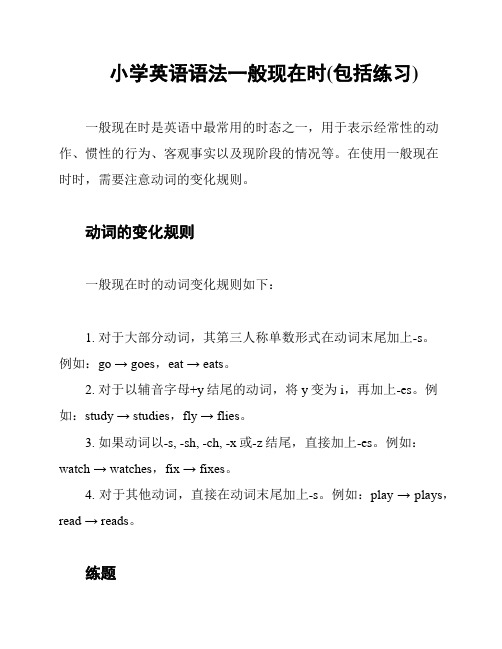
小学英语语法一般现在时(包括练习)一般现在时是英语中最常用的时态之一,用于表示经常性的动作、惯性的行为、客观事实以及现阶段的情况等。
在使用一般现在时时,需要注意动词的变化规则。
动词的变化规则一般现在时的动词变化规则如下:1. 对于大部分动词,其第三人称单数形式在动词末尾加上-s。
例如:go → goes,eat → eats。
2. 对于以辅音字母+y结尾的动词,将y变为i,再加上-es。
例如:study → studies,fly → flies。
3. 如果动词以-s, -sh, -ch, -x或-z结尾,直接加上-es。
例如:watch → watches,fix → fixes。
4. 对于其他动词,直接在动词末尾加上-s。
例如:play → plays,read → reads。
练题请根据句子的语境,用适当的动词形式填空。
每个空格只填一个单词。
1. Peter ___________ (like) to play basketball with his friends every weekend.2. My mother ___________ (work) as a nurse in the hospital.3. The cat ___________ (sleep) on the sofa most of the day.4. We ___________ (watch) movies at the cinema every Friday night.5. Sarah ___________ (brush) her teeth twice a day.参考答案1. Peter likes to play basketball with his friends every weekend.2. My mother works as a nurse in the hospital.3. The cat sleeps on the sofa most of the day.4. We watch movies at the cinema every Friday night.5. Sarah brushes her teeth twice a day.以上是关于小学英语语法一般现在时以及练习题的内容。
小学英一般现在时讲解和练习

小学英语一般现在时一. 意义:表示经常发生的事情,动作或存在的状态二. 构成及变化1.be动词的变化。
肯定句:主语+be(am,is,are)+其它。
如:I am a boy.我是一个男孩。
否定句:主语+ be + not +其它。
如:He is not a worker.他不是工人。
一般疑问句:Be +主语+其它。
如:-Are you a student? -Yes. I am. / No, I'm not.特殊疑问句:疑问词+一般疑问句。
如:Where is my bike?2. 行为动词的变化。
l、当主语为第一,二人称及复数时,助动词为do肯定句:主语+动词原形(+其它)。
如:We often play basketball after school.否定句:主语+ don't+动词原形(+其它)。
如:we don’t play basketball after school.一般疑问句:Do +主语+动词原形+其它?如: Do you often play basketball after school l? Yes, we do. / No, we don't.特殊疑问句:疑问词+以do开头的一般疑问句?如: What do you often do after school ?2、当主语为第三人称单数时 ,助动词为does肯定句:主语+动词三单式(+其它)。
如: He swims well.否定句:主语+ doesn’t+动词原形(+其它)。
如:He doesn’t swim well..一般疑问句:Does +主语+动词原形+其它。
如:Does he swim well ?Yes, he does. / No, he doesn't.特殊疑问句:疑问词+以does开头的一般疑问句?如: How does your father go to work?三.第三人称单数的动词变化规则(只有在第三人称为主语的肯定句中,动词才用三单式)(1)多数动词直接加s: runs gets likes collets takes plays climbs…….(2)结尾是s, x, sh, ch, o,前为辅音字母,结尾加es : watches teaches goes does washes crosses mixes brushes(3)动词末尾y前为辅音:将y改为i加es: study→studies fly→fliescarry→carriescry→cries但在y前如果为元音则直接加s: buys says四.时间标志:always , usually , often , sometimes ,every…一般现在时练习题(1)I.用下列单词的适当形式填空1.We often___________(play) in the playground.2.He _________(get) up at s ix o’clock.3.__________you _________(brush) your teeth every morning?4.What________________(do) he usually________________(do) after school?5.Danny ________________(study) English, Chinese, maths, science and Art at school.6.Mike sometimes __________(go) to the park with his sister.7.At eight at night, she __________(watch) TV with his parents.8.________ Mike________(read) English every day?9.How many lessons_________your classmates________(have) on Monday?10.What time_________his mother_________(do) the housework?II.改句子1.Do you often play football after school? (改为肯定句)2.I have many books.(改为否定句)3.Gao Shan’s sister likes playing table tennis (改为否定句)4.She lives in a small town near New York.(改为一般疑问句)5.I watch TV every day.(改为一般疑问句)6.We have four lessons.(改为否定句)7.Nancy doesn’t run fast (改为肯定句)8.My dog runs fast.否定句:一般疑问句:9.Mike has two letters for him.一般疑问句:否定句:10.I usually play football on Friday afternoon.否定句:一般疑问句:划线提问11.Su Yang usually washes some clothes on Saturday.否定句:一般疑问句:划线提问:12.Mingming usually waters the flowers every day.否定句:一般疑问句:13.Tom does his homework at home.否定句:一般疑问句:一般现在时练习题(2)一、用所给动词的真确形式填空1.I like ____________ (swim).2.He _________(read) English every day.3.We _________(go)to school at seven in the morning.4.Mike________(go)to school at seven in the morning.5.My mother________(like) ______(go) shopping.6.I can ________(draw) many beautiful pictures.7.She_________(make) a model plane.8.Do you ________(like)_________(run)?9.Does he_________(like)_________(jump) ?10.Does Nancy_________(grow)flowers on Saturday ?11.The teachers________(like)___________(dance).12.The teacher________(like)____________(dance).13.The students___________(speak) English in class.14.The student_________(speak) Chinese after class.15. Let’s____________and play football . ( go )16. He_____________ like swimming . ( not )17. I’m sorry ____________that . ( hear )18. Wang Bing is____________ ( write ) an E-mail to his friend .19. He has_____________a headache . ( get )20. _________you study English at school ? Yes , I___________. ( do )21. __________your sister study English at school ? No , she__________ . ( do )22. I’m _________ better . ( feel )23. Why__________Tom absent today ? ( be )二、用所给的人称改写句子1.I take photos on Sunday. ( Mike)2.We grow beautiful flowers. (she)3.They like collecting stamps. (Ben)4.I listen to music carefully. (my aunt)5.You like making a model ship. (Helen)6.We clean the classroom every day. (he)7.They look after the pandas. (Mr Wang)8.I draw a tree and some flowers. (Nancy)9.We go to bed at eight. ( my sister)10.I read newspapers in the evening. (Mr Green)一般现在时练习一、写出下列动词的第三人称单数talk______forget______hope______stop______perform______play______say______buy______worry______fly______study_______like_______make______take______love_______recite_______become_______come_______drive_______shine_______leave_____wake_______ride_______write_______hike______give______see______swim______stop______shop_______plan______get_______s it_______let_______cut_______run_______forget_______begin_______wash_____watch_______finish______teach_____fish_______reach_______go_______do_____二、用括号内动词的适当形式填空。
英语一般现在时全面讲解(附练习及答案)
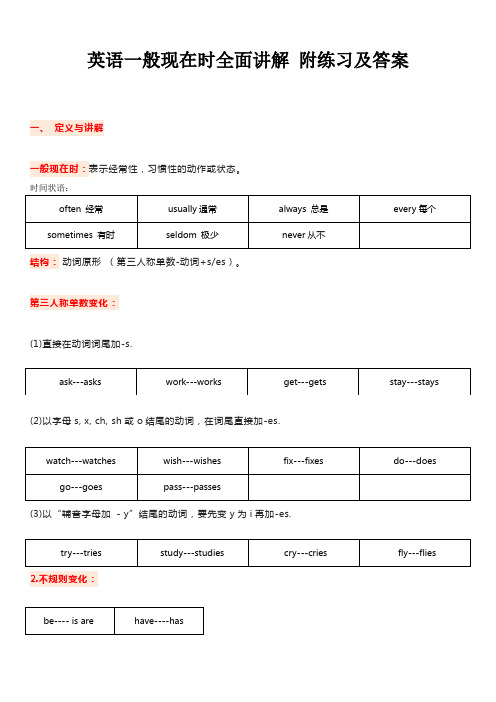
英语一般现在时全面讲解附练习及答案一、定义与讲解一般现在时:表示经常性,习惯性的动作或状态。
结构:动词原形(第三人称单数-动词+s/es)。
第三人称单数变化:(1)直接在动词词尾加-s.(2)以字母s, x, ch, sh或o结尾的动词,在词尾直接加-es.(3)以“辅音字母加- y”结尾的动词,要先变y为i再加-es.2.不规则变化:二、一般现在时用法1. 表示经常性,习惯性,永久性的动作或存在的状态.通常与副词sometimes, often, usually, always, every day (year, month ), once (twice, three times) a day,等时间状语连用。
2. 表示客观真理,科学原理,自然现象,等客观事实或格言,谚语等。
三、一般现在时的句子转换:(1)当句子中有be动词或情态动词时,则把be动词或情态动词(can,could等等)提到主语的前面变成疑问句;在be动词或情态动词后面加not变成否定句.(2)当句子中即没有be动词,也没有情态动词时,则在主语前加助动词do (you,以及复数), does(单数she,he,it)变成问句;在主语后谓语动词前加助动词don’t(I,you,以及复数), doesn’t(单数she,he,it)变成否定句,助动词后的动词要变成动词原形。
名师解析1.________ you often ________ tea?A.Do;drinks B.Does;drink C.Do;drink分析:你经常喝茶吗?根据often可知句子为一般现在时,主语为you,用助动词Do提问,动词用原形,C 符合题意,故选C。
2.My legs .A.hurt B.hurts C.hurting分析:我的腿……。
A痛,动词原形;B痛,动词单三形式,主语是名词复数,谓语动词用原形,排除;C痛,现在分词,用于现在进行时,构成be doing,缺少be,排除。
中小学语法大全之一般现在时及专项练习题 -答案

中小学精品小班课外辅导培优专题一一般现在时教学目标:1.掌握be动词的一般现在时;2.掌握实义动词的一般现在时。
重点难点:1.重点:行为动词引导的一般现在时;2.难点:当主语为第三人称单数时行为动词的变化。
一般现在时表示习惯性、经常发生的动作或存在的状态,以及客观存在的普遍真理等。
常与often, usually, sometimes,always,everyday等词连用。
1.He is my friend. We often go to school together.2.I am a student. I am twelve years old.3.He teaches English.4.There are four seasons in a year.5.The earth goes around the sun.分类:其主要形式分两大类:一类是含有be动词的句子,一类是含有实义动词的句子。
(一)be动词的一般现在时be动词的一般现在时有三种形式,即:am, is, are。
1. 如果主语是第一人称I(我)时,be动词用am。
如:I am a student. 我是一名学生。
I am 还可缩写成I'm。
如: I'm David. 我是大卫。
2. 如果主语是you (你,你们), they (他们,它们,她们)或名词复数(两个以上的人或物)时,be动词必须用are。
如:Are you twelve? 你是十二岁吗?Tom and Lily are good friends. 汤姆和莉莉是好朋友。
They are at school. 他们在学校。
are与主语还可缩写。
如: We are= We're, They are =They're, You are = You're。
而are与 not可缩写成aren't。
如:They aren't students. 他们不是学生。
小学英语一般现在时知识点全面讲解附练习及答案
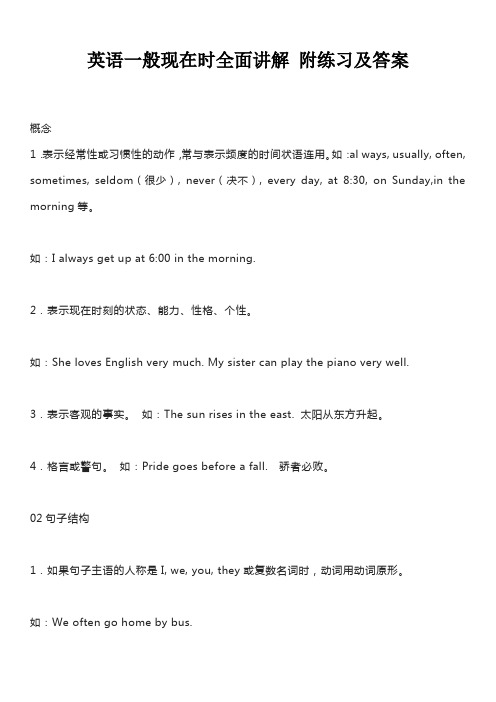
英语一般现在时全面讲解附练习及答案概念1.表示经常性或习惯性的动作,常与表示频度的时间状语连用。
如:al ways, usually, often, sometimes, seldom(很少), never(决不), every day, at 8:30, on Sunday,in the morning等。
如:I always get up at 6:00 in the morning.2.表示现在时刻的状态、能力、性格、个性。
如:She loves English very much. My sister can play the piano very well.3.表示客观的事实。
如:The sun rises in the east. 太阳从东方升起。
4.格言或警句。
如:Pride goes before a fall. 骄者必败。
02句子结构1.如果句子主语的人称是I, we, you, they或复数名词时,动词用动词原形。
如:We often go home by bus.2.如果句子的主语是第三人称单数,即:he, she, it 或单数名词时,动词要用第三人称的单数形式。
如:He often goes home by bus03动词的第三人称单数构成规则1.一般情况下在动词的后面直接加“s”;如:work→works play→plays¬ rain→rains see→sees visit→visits2.以o, x,s,sh, ch结尾的动词,在后面加“es”;如:do→does fix→fixes guess→guesses wash→washes teach→teaches3.以辅音字母加y结尾的动词,先把“y”改为“i”, 再加“es”;如:fly→flies study→studies carry→carries4.不规则变化。
如:have→has04注意在一般现在时的句子中,如果前面使用了助动词does, doesn’t, will, won’t, can, can’t, would, wouldn’t, must, mustn’t 等,尽管主语是第三人称单数,后面的动词用动词原形。
小学语法专题:一般现在时全练全解析
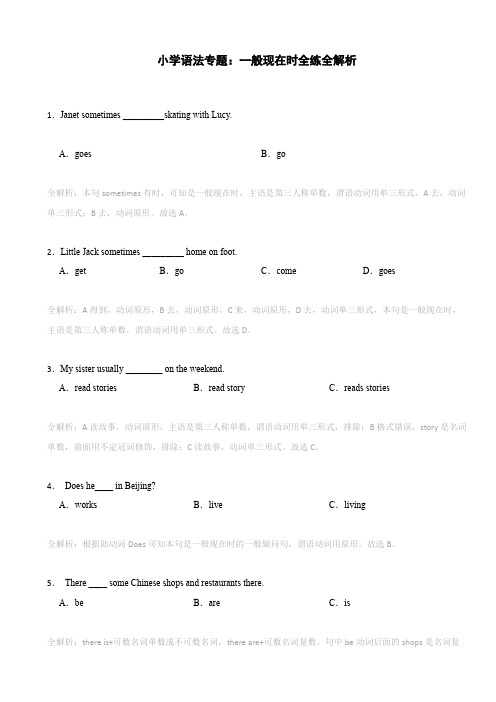
小学语法专题:一般现在时全练全解析1.Janet sometimes _________skating with Lucy.A.goes B.go全解析:本句sometimes有时,可知是一般现在时,主语是第三人称单数,谓语动词用单三形式,A去,动词单三形式;B去,动词原形。
故选A。
2.Little Jack sometimes _________ home on foot.A.get B.go C.come D.goes全解析:A得到,动词原形,B去,动词原形,C来,动词原形,D去,动词单三形式,本句是一般现在时,主语是第三人称单数,谓语动词用单三形式。
故选D。
3.My sister usually ________ on the weekend.A.read stories B.read story C.reads stories全解析:A读故事,动词原形,主语是第三人称单数,谓语动词用单三形式,排除;B格式错误,story是名词单数,前面用不定冠词修饰,排除;C读故事,动词单三形式。
故选C。
4.Does he____ in Beijing?A.works B.live C.living全解析:根据助动词Does可知本句是一般现在时的一般疑问句,谓语动词用原形。
故选B。
5.There ____ some Chinese shops and restaurants there.A.be B.are C.is数,故答案选B。
6.— What does this sign ?— It you can't smoke here.A.means; mean B.mean; meansC.mean; mean D.means; means全解析:根据问句是一般现在时的特殊疑问句,谓语动词用原形;答语是第三人称单数,谓语动词用单三形式,故选B.7.Before, you______ long hair very much, but now you always______ it short.A.liked, keeped B.liked, keep C.likes, keep全解析:keep+宾语+形容词:表示保持…怎么样。
- 1、下载文档前请自行甄别文档内容的完整性,平台不提供额外的编辑、内容补充、找答案等附加服务。
- 2、"仅部分预览"的文档,不可在线预览部分如存在完整性等问题,可反馈申请退款(可完整预览的文档不适用该条件!)。
- 3、如文档侵犯您的权益,请联系客服反馈,我们会尽快为您处理(人工客服工作时间:9:00-18:30)。
一般现在时讲解及练习1.一般现在时:1.表示事物或人物的特征、状态。
如:The sky is blue.天空是蓝色的。
2.表示经常性或习惯性的动作。
如:I get up at six every day.我每天六点起床。
3.表示客观现实。
如:The earth goes around the sun.地球绕着太阳转。
2.构成:1. be动词:主语+be(am,is,are)+其它。
如:I am a boy.我是一个男孩。
2.行为动词:主语+行为动词(+其它)。
如:We study English.我们学习英语。
当主语为第三人称单数(he, she,it)时,要在动词后加"-s"或"-es"。
如:Mary likes Chinese.玛丽喜欢汉语。
注意:一般现在时经常和频率副词连用。
3.我的变化--否定句、一般疑问句、特殊疑问句:1. be动词的变化。
否定句:主语+ be + not +其它。
如:He is not a worker.他不是工人。
一般疑问句:Be +主语+其它。
如:-Are you a student?-Yes. I am. / No, I'm not.特殊疑问句:疑问词+一般疑问句。
如:Where is my bike?2.行为动词的变化。
否定句:主语+ don't( doesn't ) +动词原形(+其它)。
如:I don't like bread.当主语为第三人称单数时,要用doesn't构成否定句。
如:He doesn't often play.一般疑问句:Do( Does ) +主语+动词原形+其它。
如:- Do you often play football?- Yes, I do. / No, I don't.当主语为第三人称单数时,要用does构成一般疑问句。
如:- Does she go to work by bike?- Yes, she does. / No, she doesn't.特殊疑问句:疑问词+一般疑问句。
如:How does your father go to work?动词第三人称单数形式构成规则动词原形变第三人称单数的规则与发音规律同名词单数变复数大致相同,请认真观察。
1、大多数动词在词尾加“S”在清辅音后发音为[s],在浊辅音及元音后发音为[z]。
如:①stop-stops [s] make-makes [s]②read-reads [z] play-plays [z]2、以辅音字母加“y”结尾的,要先将“y”变为“i”,然后在加“es”读[iz] 如:fly-flies [z] carry-carries [z]study-studies [z] worry-worries3、以“s, x, ch, sh”结尾的,在词尾加“es”,发音为[iz] 如:teach-teaches [iz] watch-watches [iz]4、以“o”结尾的动词,加“es”,读[z] 如:go-goes [z] do-does [z下面几个动词变为单数时,原词的元音部分的发音发生了较大的变化,请注意记忆。
如:1)、do [du:]-does [dz]2)、say [sei]-says [sez]以不发音字母“e”结尾的开音节词,如果尾音是[s],[z]时,加“s”后字母“e”发音,与所加“s”一起读做[iz]。
如: close-closes [iz]be动词包括:am, is, are。
第三人称单数用 is;过去式为 was;复数are,过去式为were. have,遇到主语是第三人称单数时,要用 has;动词 be 的第三人称单一般现在时练习题(一)写出下列动词的第三人称单数形式:drink--___________ go-- _____________ stay-- ____________ make--___________ look--__________ carry--___________ come-- ___________ watch--___________ plant--_____________ fly --_____________ do--______________ sit--______________ guess--_____________die--______________go--______________rush-- __________reach--_____________touch--_____________brush--____________fly-- _____________copy-- ____________say-- _____________run--______________do-- ______________fix-- _____________live--______________cry--______________enjoy--_____________have--_____________wish--_____________play--_____________teach-- ___________buy--_____________study-- ___________(二)用所给词的正确形式填空。
1.What_____(do)Alice find?2.Which toy_____(do) she like?3.He doesn’t______(know)her name.4.Where _____(do)Grandma live?5.The boy_______(chase) it.6.Grandma Wang___(live) in Pudong.7.When ______(do)he get up?8.Kitty______(watch)TV everyday.9.John can’t_______(find) his watch.(三)选择题1.Jack and her mother _____happy.A.doesB.areC.isD. have2..Her mother ______the beanstalk.A.takeB.is take Ctakes D. taking3.The woman_______the beanstalk.A.cutB.cuttingC.are cutD.cuts4.The goose_______golden eggs.yysyedyes5.Supergirl and Superdog______them.A.savesB.saveC.savingD.is saving6.Ben_____a new bicycle.A.haveB.hasC.areD.were7. A man _____in front of his car.A.walkB.walksC.walkingD.work8.How _____it feel?A.doesB.doC.areD.is9.-He came early this morning, didn't he?-Yes, he did. He often___ to school early.A. comeB. comesC. cameD. has come10.Ann ____ her hair every week.A. is going to washB. washC. washesD. is washing11.They usually_____TV in the evening.A. watchB. will watchC. are watchingD. watches12.The sun ___ in the east and___ in the west.A. raises; setB. rise; setsC. rises; setsD. rises; set13.-I usually have milk and bread for breakfast. What about you, Jim? -So do I, but my sister ___.A. hasn'tB. doesn'tC. didn'tD. won't14.She will go if it ___ tomorrow.A. isn't rainB. don't rainC. doesn't rainD. didn't rain15.These little boys___ playing football.A. are likingB. likeC. likesD. were liking16.-___ he ___ to work on foot? -Yes, he___.A. Do; go; doB. Does; go; doesC. Is; going; doesD. Does; go; is17.-_____ they often ___ these old men?-Yes, they___.A. Do; help; areB.Are; helping; areC. Do; help; doD. Are; helped; are(四)变否定句。
1. He wants a book.______________________________________________________________2. Jimmy washes hands before dinner.______________________________________________________________3. Lisa likes milk very much.______________________________________________________________4. They walk to school.______________________________________________________________5. Lingling and Dandan are 10 years old.______________________________________________________________ (五)变一般疑问句并作肯定和否定回答。
